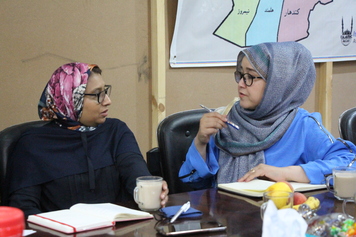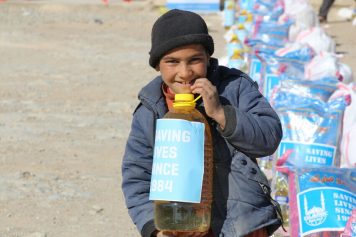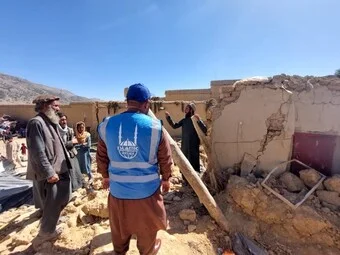Drought, hunger and a severe economic crisis are among the challenges confronting the people of Afghanistan. A year on from a moment of political change in the country, Islamic Relief’s Safia Zahed reflects on the realities of daily life for families, including those she has met while working on the orphan sponsorship programme.

Afghanistan has faced multiple challenges over the past year. Most families have very little money and cannot afford enough food. While there is food for sale in the markets, price rises have made even basic items unaffordable for many. As a result, we are seeing a sharp increase in hunger and malnutrition.
People are selling any assets they have – including their homes – just to buy food. The situation is so desperate that some parents have resorted to selling their children as they can no longer afford to feed the whole family.
Missing out on childhood
It is children who are bearing the brunt of the dire economic situation, with an increase in early and forced marriage, and many being taken out of school and put to work to help support their families. In this environment, orphaned children are perhaps even more vulnerable.
Islamic Relief’s orphan sponsorship programme is a lifeline to orphaned children, including the children of widowed mothers, who receive regular cash payments that help children stay in school, access healthcare and pursue hobbies.
The programme’s aim is to give children the support they need to enjoy a safe and happy childhood and prepare for a bright future. A significant achievement of the programme in Afghanistan is that some of the orphans who have graduated from the programme are now in stable employment.
I’m proud to say that I have supported orphaned children by working on the programme and I’d like to thank those who donate to make this work possible. Thanks to their generosity, tens of thousands of children have received sponsorship, including more than 5,000 children in Afghanistan.
Finding work as a widow
Working with widows and orphans quite closely, I see their challenges first hand. The living conditions of the widows whose children we support are poor and many women are limited in the types of employment they can seek.
High levels of illiteracy confine many women to working as cleaners in other people’s homes, receiving only a small amount of money for their labour that is not enough to cover household expenses.
However, in the current economic situation, many families can no longer afford to employ someone to clean their home, so women’s options for employment have become even more limited. Working outside the home can also be dangerous for women due to negative social attitudes.
Faced with this situation, many widows are forced to remarry and sometimes find that their children are not provided for by their new husband. Children as young as 10 are working in garages, carpentry shops, tailoring shops, or as cleaners to help support their family.

As well as preventing them from accessing education, which could harm their future employment options, working in such places can also be dangerous for children. I recently met a young boy who lost his fingers while working as a mechanic.
While many children may be sent out to work, older orphaned girls often stay home to help look after their siblings, missing out on education and sometimes on marriage in the process.
I recently met a 27-year-old woman who said she could not marry because that would leave no one to take care of her 5 siblings. Caring for her siblings has also prevented her finding work so she could only scrape an income together from washing people’s clothes at home. The money helps provide food for her siblings, but it is not enough to cover the medicine the woman needs to treat her diabetes.
A vital UN partnership
As the economic crisis worsens, men are also struggling to find work. Some have been forced to look overseas for survival, and educated people are working as road labourers to make ends meet.
The economic difficulties are one of the reasons Islamic Relief Afghanistan signed a key new partnership agreement with the United Nations Development Programme (UNDP) in March this year to create jobs and provide cash to those in need.
The $22million UNDP ABADEI project will provide job opportunities to more than 158,000 skilled and unskilled people through Cash for Work, by paying them to rehabilitate and develop community-based irrigation and agriculture, improving not only employment but also food security.
The project is also supporting 1,200 women to take steps towards entrepreneurship by providing technical and business management training as well as helping them to access markets and providing grants for women-run businesses.
It will also support vulnerable people – including widows, new born children, disabled people and the elderly – with cash assistance in 6 provinces across Afghanistan.
This project is one of the ways in which Islamic Relief is working to support Afghans through long-term projects aimed at establishing sustainable livelihoods.
Our emergency food response – which at times provides the only food a family eats – will continue, as our humanitarian and development work in Afghanistan expands.
A fresh crisis
In June, Afghanistan suffered another crisis when a 5.9-magnitude earthquake hit the country’s southeast, affecting Paktika and Khost provinces.
The scale of the devastation was massive, with more than 1,300 people killed, according to authorities and NGOs. Thousands of homes in the affected provinces, where houses are made from mud, were completely destroyed by the earthquake, leaving survivors without shelter.
Islamic Relief sent an emergency team to distribute food to more than 900 families and has been continued to support those affected in the months since the disaster.

The earthquake struck communities already impacted by economic collapse and political change. Their desperate situation has become even more so and is unlikely to improve without serious assistance from the international community.
Islamic Relief is scaling up our work in Afghanistan this year in response to the dire humanitarian situation and I hope other organisations will follow this example.
I am very proud of everything Islamic Relief has achieved in Afghanistan and elsewhere in the past year, and I hope we can continue working to support the most vulnerable people.
Help Islamic Relief reach people in need in Afghanistan. Donate now.
BROWSE OTHER OPINIONS
FEATURED OPINIONS
- Türkiye-Syria Earthquake: A week of sheer horror but also humanity at its best
- Hope away from home: Celebrating the resilience of refugees
- I still can’t believe I’m alive – but I’m afraid Gaza may face this fear and heartbreak again
- Central African Republic Blog #7
- Gaza crisis: Reuniting with my neighbour reminded me how much I miss my old life
MOST POPULAR TOPIC
View More









